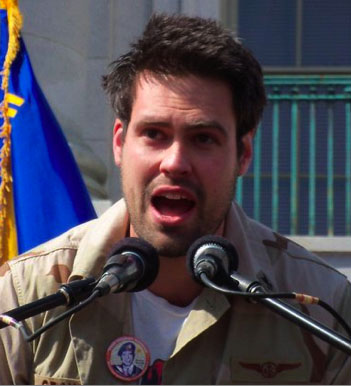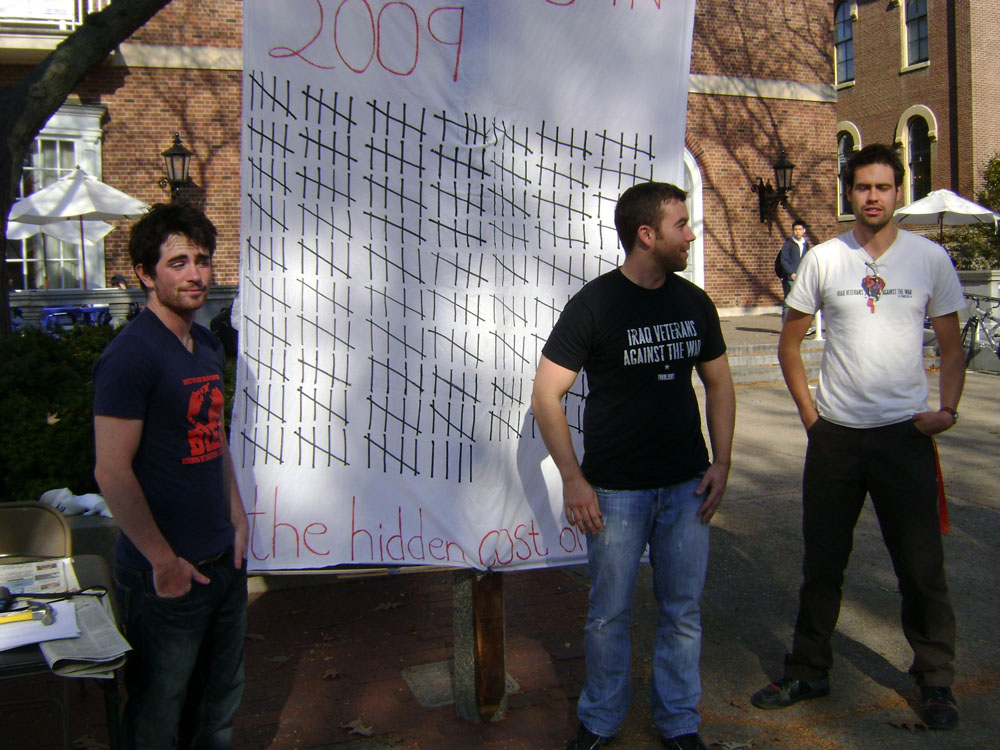 |
Central Illinois IVAW: Back in the StruggleBy Jacob Crawford, Scott Kimball and Sarah LazareAs we enter into the tenth year of the war in Afghanistan and the 9th year of the war in Iraq, we are seeing the persistence of a movement to counter these wars. Showing our presence in schools, community centers, union halls, workplaces and military bases throughout the United States. The anti-war movement is resuscitating itself, recognizing the need for grassroots organizing at the local level. The Central Illinois Iraq Veterans Against the War would like to share the story of our own chapter's reactivation and local organizing in the heartland.
With an influx of new members and allies, this fall marked the revitalization of the Central Illinois IVAW chapter. Old members who had been inactive since the election of President Obama, along with new blood, decided to re-start local efforts to build a veteran and ally community against the wars in Iraq and Afghanistan. We started with simple outreach on campus at the University of Illinois Champaign-Urbana, setting up a table on the quad and passing out literature while asking people what they thought about the occupations. Through this physical presence, we met students, faculty, workers, and veterans, many of whom shared our concerns about the wars. We were able to raise awareness as well as recruit new IVAW members and ally activists. We also built relationships with organizations such as the Graduate Employee Organization, the labor union that represents graduate students on campus, who played an instrumental role in helping us get the resources we needed for our tabling efforts. Later in the fall, we organized an outreach event to bring attention to military suicides. On Veterans Day, we hung a large banner the size of a bed with one tally mark for every US Army soldier that took his/her own life in 2009. This artistic spectacle captured the attention of students and faculty alike. The chilling image representing our brothers and sisters we have lost to suicide connected the passers by to this epidemic we know all too well. We coupled this local work with increasing involvement in the national Operation Recovery Campaign which demands an end to the cruel and inhumane practice of redeploying traumatized troops before they are fully healed from Military Sexual Trauma (MST), Post-Traumatic Stress Disorder (PTSD), Traumatic Brain Injury (TBI) and other wounds. In November, several Central Illinois IVAW members and allies traveled to Fort Campbell, Kentucky to support Jeff Hanks, an active duty soldier being forced to redeploy to Afghanistan despite severe PTSD sustained during his previous deployments to Iraq and Afghanistan. Local members met with Hanks to find out what we could do to support his fight to protect his right to heal. We returned in January to follow up with Hanks after learning that he was scheduled for redeployment, despite the public outcry about mistreatment he was facing at the hands of the military. IVAW members and allies hand-delivered a legal notice to several commanding officers at the base, informing them that, through the help of his lawyer, Hanks was seeking redress for wrongdoing. Most importantly, we met with Hanks' family, built relationships, and learned about what they were struggling with. Hanks ended up not deploying, but we know that for every Jeff Hanks who goes public, there are countless others who ship off with profound wounds, a practice that underlies the wars in Iraq and Afghanistan. Our work on the national Operation Recovery campaign also included participation in national strategy meetings, spaces that are vital for building community and determining the course of our efforts. In January, about 40 veterans and allies from around the country converged at Coffee Strong, the GI Coffee House just outside of Fort Lewis, Washington, to hatch plans for the coming roll-out of the campaign. It was incredibly powerful to be face-to-face with others from around the country doing local work integrated into a national campaign to take on the military. To bring the campaign back to our community in Champaign-Urbana, we hosted a speakers' panel on military suicides, MST, PTSD, and TBI, highlighting the testimony of IVAW members, VVAW members, foreign policy analysts, and mental health professionals. Hans Buwalda, mental healthcare professional, explained that it is inhumane to redeploy traumatized troops back into the war zone responsible for their trauma, a practice that runs rampant in today's military. Champaign-Urbana and Chicago IVAW members shared their personal experiences with trauma within the military and the challenges of dealing with traumatic experiences after transitioning back to civilian life. Joe Miller, a VVAW national coordinator, explained that it was Vietnam veteran organizing that put the issue of PTSD on the map, not the benevolence of the Department of Veteran Affairs. This panel offered a space for sharing personal stories, while providing a systemic analysis about the root causes of perpetual war and trauma. We were also able to meet community members who are interested in supporting our future work.
Soon after, the Wisconsin and Midwestern protests to protect public workers rights catalyzed regional IVAW mobilization in support of Wisconsin workers. As we have been organizing to stop the wars abroad, a war was brought to us at home. After Wisconsin Governor Scott Walker pushed the Budget Repair bill that sought to strip public sector unions of the right to collectively bargain, IVAW chapters from all over the country came to protest the legislation and stand in solidarity with the unions, including members from our chapter. We insisted that we are public workers too, and the Wisconsin National Guard should refuse and resist any mobilization orders against workers fighting for their rights. Two weeks later, the Madison IVAW chapter organized an anti-war rally on the Wisconsin capitol grounds for the 8th anniversary of the invasion of Iraq. The rally started with scores of IVAW members marching slowly toward the capitol building with a larger contingent of Veterans For Peace Marching behind them. Halfway into the march the Wisconsin firefighters' union bagpipes band joined with IVAW and marched with us to the capitol. Machinists, teachers, students, construction workers, and many other workers marched with us as we demanded an end to the wars in Iraq and Afghanistan. At the capitol, IVAW was accompanied by labor in our call to end the wars abroad as well as the war against the workers at home. In this past year, we have learned the importance of building local community and membership, coordinated across different regions and intersecting issues. It was our self-organizing as a community of veterans and allies that allowed us to build the strength of our movement. This not only allowed us to make strides in our own efforts to end the wars, but it also empowered us to act in solidarity with other communities fighting for their rights. By standing with labor in Wisconsin, we have reached a vital turning point in the anti-war movement, bringing union and anti-war activists together to connect the dots between the erosion of workers' rights and public goods at home and endless and unjust wars abroad. Furthermore, through our local participation in the national Operation Recovery campaign, we also stand in solidarity with the people of Iraq and Afghanistan, for without the redeployment of traumatized troops, these unjust wars could not continue. We have come to the realization that as our community grows so does our power. We are hopeful that these examples of local building can continue to grow and web together, forming a movement strong enough to take on the forces we are up against. Jacob Crawford and Scott Kimball are organizers with the Central Illinois chapter of IVAW. Sarah Lazare is an organizer with the Civilian-Soldier Alliance.
|



